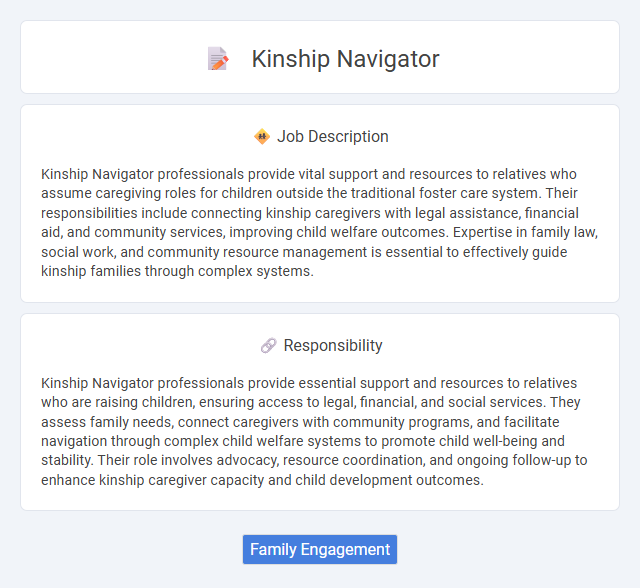
Kinship Navigator professionals provide vital support and resources to relatives who assume caregiving roles for children outside the traditional foster care system. Their responsibilities include connecting kinship caregivers with legal assistance, financial aid, and community services, improving child welfare outcomes. Expertise in family law, social work, and community resource management is essential to effectively guide kinship families through complex systems.
People who have strong communication skills and patience are likely to be suitable for a Kinship Navigator job, as the role involves guiding families through complex legal and social service systems. Individuals who are empathetic and possess problem-solving abilities may have a higher probability of success, given the need to support and advocate for relative caregivers. Those who struggle with high-stress environments or lack interpersonal skills might find this position challenging and less suitable.
Qualification
A Kinship Navigator must possess a background in social work, psychology, or related fields, often requiring a bachelor's degree as a minimum qualification. Strong knowledge of community resources, child welfare regulations, and family support services is essential to effectively guide relatives caring for children. Excellent communication skills and experience in case management further enhance the ability to provide personalized assistance and advocacy.
Responsibility
Kinship Navigator professionals provide essential support and resources to relatives who are raising children, ensuring access to legal, financial, and social services. They assess family needs, connect caregivers with community programs, and facilitate navigation through complex child welfare systems to promote child well-being and stability. Their role involves advocacy, resource coordination, and ongoing follow-up to enhance kinship caregiver capacity and child development outcomes.
Benefit
Kinship navigator jobs likely provide valuable support to relatives raising children by connecting them with crucial resources and services, improving family stability and child welfare outcomes. These roles probably enhance community well-being by reducing foster care placements through early intervention and guidance. Kinship navigators might also experience personal fulfillment from helping families navigate complex systems and access needed assistance.
Challenge
Kinship navigator jobs likely involve navigating complex family dynamics and legal systems, presenting challenges in balancing emotional support with practical guidance. The role probably requires handling sensitive situations where relatives must step into caregiving roles unexpectedly, demanding strong problem-solving skills and empathy. Navigators may often face difficulties coordinating resources and services while managing the uncertainty of each family's unique circumstances.
Career Advancement
Kinship navigators support relatives raising children by connecting them to essential social services and resources. Career advancement opportunities include roles like senior kinship navigator, program coordinator, or social services manager, where professionals lead teams and develop community outreach strategies. Gaining certifications in social work or family counseling enhances prospects for higher-level leadership positions within nonprofit organizations or government agencies.
Key Terms
Family Engagement
Kinship navigators specialize in supporting relatives who provide care for children, offering resources and guidance to strengthen family engagement and stability. They connect kinship families with community services, legal assistance, and emotional support to enhance the child's well-being within the family unit. Their role is essential in promoting positive outcomes by fostering trust, communication, and active involvement among caregivers and children.
 kuljobs.com
kuljobs.com